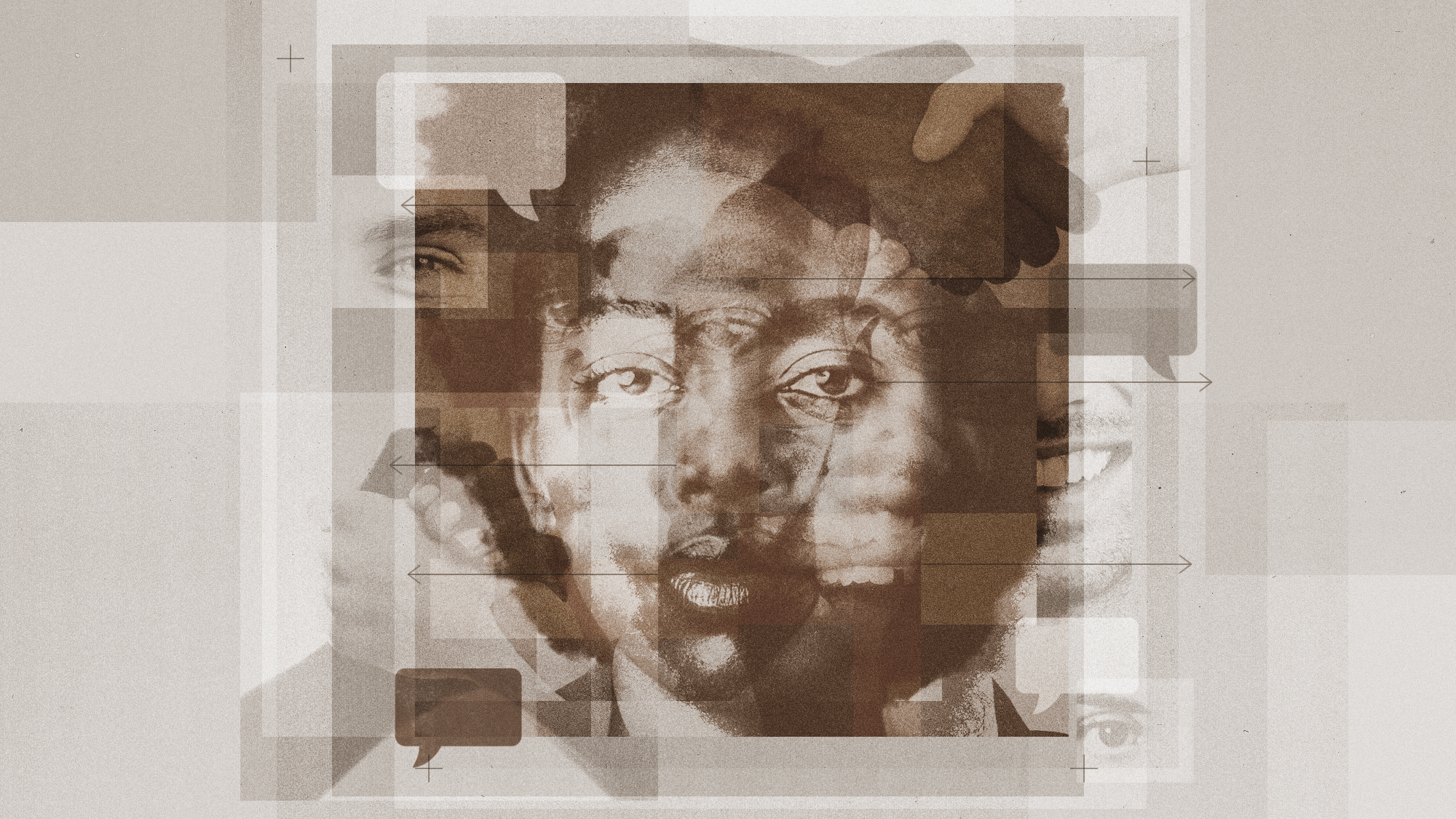Code-switching: the origins, purpose and pitfalls
Balancing your identity and respectability politics sometimes means taking on a different tone or behavior to fit in


A free daily email with the biggest news stories of the day – and the best features from TheWeek.com
You are now subscribed
Your newsletter sign-up was successful
Vice President Kamala Harris ruffled some feathers when she appeared to adopt a different tone or accent with a crowd than she had previously during her recent campaign trip to Detroit to talk about labor unions. As videos circulated of the speech, her critics accused her of using linguistic pandering and being inauthentic. However, many rushed to her defense, noting there is a name for what Harris was doing: code-switching.
What is code-switching, and why do people do it?
The definition of code-switching has evolved over the years, but initially, it was a term used in linguistics to describe tailoring your language to your present social context. That could mean switching from one language to another when you are at home versus outside of your home environment. In terms of language, code-switching can also refer to switching between dialects or colloquial versions of a language, which is "common among Black Americans who speak AAL (African American Language, a.k.a. African American Vernacular English) in social contexts but may forgo it in formal settings," said Mental Floss. For many contemporary scholars, code-switching "transcends language altogether."
Code-switching has come to be defined as "a way of changing your style, dress or maybe even language or behavior, in order to match what you think would be appropriate or would make someone else feel comfortable," psychologist Kia-Rai Prewitt said to the Cleveland Clinic. Code-switching is usually discussed in terms of race or ethnicity, but because identity is so complex, it can happen in a variety of contexts. Your racial or ethnic background may not put you in the position to need to code-switch, but your "religion, immigration status, socioeconomic class, level of education, gender identity or ability status does," the clinic said. "None of us have just one absolute identity," Prewitt said, "but I do think the salience of our identity — or the identity that we consider most relevant at the moment — depends on the context you're in."
The Week
Escape your echo chamber. Get the facts behind the news, plus analysis from multiple perspectives.

Sign up for The Week's Free Newsletters
From our morning news briefing to a weekly Good News Newsletter, get the best of The Week delivered directly to your inbox.
From our morning news briefing to a weekly Good News Newsletter, get the best of The Week delivered directly to your inbox.
Sometimes, code-switching is an intentional choice made to fit in; other times, doing so is automatic, and you unknowingly end up slipping into a different accent or language when speaking to certain people. Either way, there are plenty of reasons why people code-switch. People do it to avoid being stereotyped other times, or they are "responding to an institutional culture or expectation," the clinic said. "We may even code-switch because it makes us feel safe."
The downside of code-switching
Code-switching can be problematic, especially when people feel "forced to bury elements of their identity" to "prioritize other people's prejudices over their own comfort and/or avoid getting stereotyped," Mental Floss said. Examples of code-switching under pressure include "cover[ing] up traditional tattoos — like Inuit kakiniit or Maori ta moko — to fit in with others," letting people use a nickname instead of making them pronounce your real name, avoiding wearing a hijab or yarmulke "to avoid attracting unwanted attention" and "adjusting [your] vocal cadence to 'sound straight,'" said the Cleveland Clinic.
For some, code-switching can ignite internal conflict because it feels like you are rejecting your culture and background. And while it is "frequently seen as crucial for professional advancement," code-switching also "often comes at a great psychological cost," said Harvard Business Review. It can also come with "social and psychological repercussions." Downplaying aspects of your identity can "generate hostility from in-group members, increasing the likelihood that those who code-switch will be accused of 'acting white'." Constantly dodging stereotypes can "deplete cognitive resources and hinder performance," Harvard Business Review added. "Feigning commonality with coworkers also reduces authentic self-expression and contributes to burnout."
Code-switching can also "inadvertently reinforce stereotypes," said LaFawn Davis, the senior vice president of Environmental, Social & Governance at Indeed, in Fast Company. "I can't tell you the number of times I have corrected someone for saying that someone's communication was not angry (as the angry Black woman trope goes), but direct," she added. Most of the time, the issue is not with what was being said but with the messenger. "This kind of bias needs constant and vigilant examination," Davis said.
A free daily email with the biggest news stories of the day – and the best features from TheWeek.com
Theara Coleman has worked as a staff writer at The Week since September 2022. She frequently writes about technology, education, literature and general news. She was previously a contributing writer and assistant editor at Honeysuckle Magazine, where she covered racial politics and cannabis industry news.
-
 How the FCC’s ‘equal time’ rule works
How the FCC’s ‘equal time’ rule worksIn the Spotlight The law is at the heart of the Colbert-CBS conflict
-
 What is the endgame in the DHS shutdown?
What is the endgame in the DHS shutdown?Today’s Big Question Democrats want to rein in ICE’s immigration crackdown
-
 ‘Poor time management isn’t just an inconvenience’
‘Poor time management isn’t just an inconvenience’Instant Opinion Opinion, comment and editorials of the day
-
 The 8 best superhero movies of all time
The 8 best superhero movies of all timethe week recommends A genre that now dominates studio filmmaking once struggled to get anyone to take it seriously
-
 Josh D’Amaro: the theme park guru taking over Disney
Josh D’Amaro: the theme park guru taking over DisneyIn the Spotlight D’Amaro has worked for the Mouse House for 27 years
-
 Quiet divorce is sneaking up on older couples
Quiet divorce is sneaking up on older couplesThe explainer Checking out; not blowing up
-
 Admin night: the TikTok trend turning paperwork into a party
Admin night: the TikTok trend turning paperwork into a partyThe Explainer Grab your friends and make a night of tackling the most boring tasks
-
 The best fan fiction that went mainstream
The best fan fiction that went mainstreamThe Week Recommends Fan fiction websites are a treasure trove of future darlings of publishing
-
 Golden Globes affirm ‘One Battle,’ boost ‘Hamnet’
Golden Globes affirm ‘One Battle,’ boost ‘Hamnet’Speed Read Comedian Nikki Glaser hosted the ceremony
-
 ‘One Battle After Another’ wins Critics Choice honors
‘One Battle After Another’ wins Critics Choice honorsSpeed Read Paul Thomas Anderson’s latest film, which stars Leonardo DiCaprio, won best picture at the 31st Critics Choice Awards
-
 The best alcohol-free alternatives for Dry January
The best alcohol-free alternatives for Dry JanuaryThe Week Recommends Whether emerging from a boozy Christmas, or seeking a change in 2026, here are some of the best non-alcoholic beers, wines and spirits to enjoy
